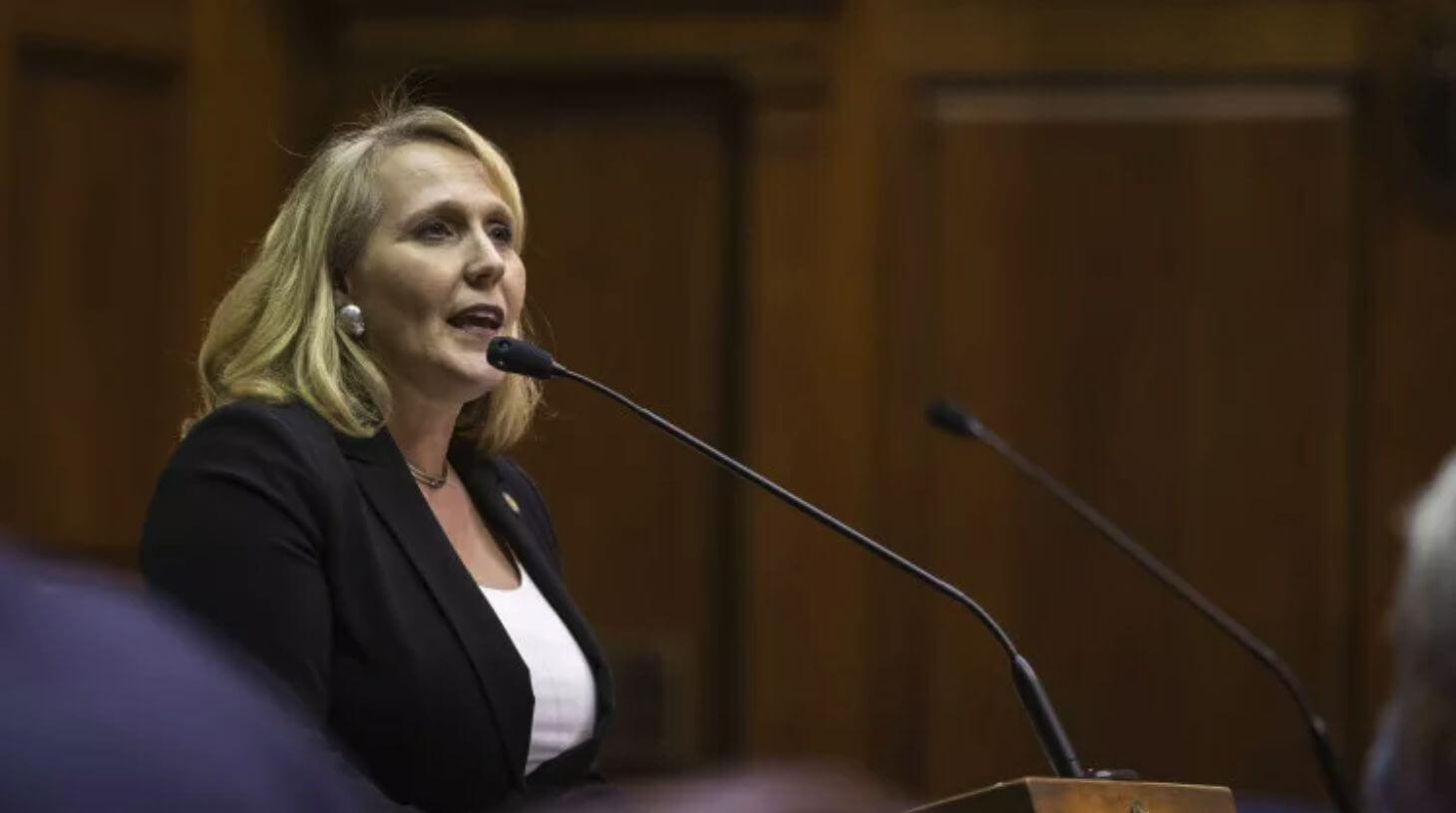5/1 Torchbearer Weekly Policy Update
… And we’re back! Thanks for bearing with us as we took an unanticipated break from this weekly newsletter to finish the end of the 2023 legislative session. Thank you for allowing us to be your trusted source for news at the local, state, and federal levels.
Local, state, and federal highlights in this week’s memo include:
- Republican State Lawmaker Announces Resignation Hours After End of 2023 Session
- What Bills Died During the 2023 Legislative Session?
- Union-backed Democrats Fend Off New Wave
- Here Are the 10 Indiana Schools with a Referendum on May 2 Primary Ballot
- Department of Workforce Development Head Resigns, Holcomb Appoints New Commissioner
- Share the Torchbearer Newsletter with Your Network!
- Important Dates
Let’s dive in.
Republican State Lawmaker Announces Resignation Hours After End of 2023 Session

Breaking: Rep. Ann Vermilion (R-Marion) announced late Friday night she is leaving her Statehouse seat, effective Monday.
The details; In a letter to the Speaker of the House and a Facebook post, Vermilion said her decision to resign was made “without hesitation, with utter peace and anticipation of our family’s future endeavors.”
Vermilion, a health care consultant and former hospital administrator, has helped lead on health care issues in her more than three years in the General Assembly. This session, she was the lead House sponsor of SB 1, a measure aimed at improving mental health care access.
The Republican has also split from her party on some high-profile issues, including last year’s abortion ban and this year’s ban on gender-affirming care for transgender youth in committee.
What’s next: A Republican precinct caucus will choose a replacement to serve the rest of Vermilion’s term. In her social media post, Vermilion backed Lori Goss-Reaves, a social worker and Indiana Wesleyan University professor, to replace her. (WFYI)
What Bills Died During the 2023 Legislative Session

What’s new: Lawmakers filed more than 1,200 bills this year, but not every piece of legislation was destined to become law. Many died during the first half of the session when they missed legislative deadlines. Others died during the second half of the session despite looking like they had the momentum, at some point in time, to become law.
Here are some significant bills that died in the last few weeks:
Compensation for Boy Scouts victims
- A bill aimed to temporarily waive the statute of limitations, which would have allowed 760 child sex abuse victims in the state to receive the full compensation amount they're owed from the Boy Scouts of America bankruptcy settlement, died.
- There are 80,000 plaintiffs in the lawsuit against the Boy Scouts over decades of sexual abuse claims, a case which settled out of bankruptcy court for $2.46 billion dollars.
- House Bill 1400 had unanimously passed the House but did not receive a hearing in the Senate.
Decriminalizing HIV exposure
- A bill seeking to bring Indiana law up to speed with medical science on the spread of HIV died in the Senate after passing the House 78-19.
- Laws on the books since the 1980s single out people living with HIV and give them stiffer penalties for certain acts, from donating blood or semen to spitting on another individual. The modern scientific consensus today is that HIV cannot be transmitted through spitting, and people living with HIV can safely give blood if they're being treated and have an undetectable trace of the virus.
- House Bill 1198, authored by Rep. Wendy McNamara, R-Evansville, would have eliminated those stiffer penalties — felonies — for people living with HIV.
Protesting outside homes
- Senate Bill 348, which would have made protesting or picketing outside a residence in certain cases a Class C misdemeanor, passed the Senate but did not receive a House hearing.
- Protestors would have faced arrest if law enforcement asked them to leave and they ignored the command.
Pet store bans
- Senate Bill 134, authored by Sen. Blake Doriot, R-Goshen, would have rolled back Indianapolis' ban on selling dogs at pet stores as well as prevented cities from implementing any similar bans. Indianapolis banned such sales in an effort to prevent the sale of dogs from puppy mills.
- While supporters say this bill would have protected responsible local businesses, opposition said it would allow illegal breeders to continue and takes a tool away from local governments.
- The bill died in committee.
Sale of cold mixed drinks
- An effort to ban the sale of cold, ready-to-drink liquor beverages like seltzers in grocery stores and pharmacies was tacked onto Senate Bill 20 late in session, but then removed from the bill in a conference committee.
- Grocers and pharmacies opposed the legislation, but liquor store owners, who would have been able to continue selling such drinks under the measure, supported it.
Compassionate release
- A bill detailing a system to allow prisons to release terminally ill and elderly incarcerated people passed the House 89-1 but died in the Senate.
- Author Rep. Bob Morris, R-Fort Wayne, thinks House Bill 1648, would have reduced prison populations and saved tax dollars spent on typically expensive end-of-life care by allowing offenders who have served most of sentences to live out their remaining months at home and with outside care.
Residential tax increment financing
- Senate Bill 300 would have removed certain restrictions on where and when housing developers and builders can use tax increment financing to divert property tax revenue from schools and local governments to pay for infrastructure like streets, sidewalks and sewers in new housing developments.
- Opponents said the bill would have profited homebuilders but would not have required the new homes to be affordable, which was the stated purposes of the measure. It also would have taken away the right of school boards, which rely upon property taxes, to oppose such TIF districts.
- The bill passed the Senate but died in the House.
Holding nonprofits accountable
- A bill to expand the attorney general's legal authority to hold nonprofit corporations accountable for mismanagement passed out of the House 77-19 but died in the Senate.
- House Bill 1075 comes after Attorney General Todd Rokita's prolonged fight last year against a negligent nonprofit corporation landlord that failed to pay water bills despite collecting tenants' rent in Indianapolis, leading to the water utility company cutting off water to apartments.
- A similar bill, Senate Bill 278, was heard in the Senate Judiciary committee on Jan. 25 to criticism from committee chair Sen. Liz Brown, R-Fort Wayne, who said it might harm small nonprofits that are well-intentioned but poorly managed. (IndyStar)
Union-backed Democrats Fend Off New Wave

An uptick in competitive primary elections will test labor union influence over Indianapolis politics.
Driving the news: All 25 City-County Council seats are on the ballot Tuesday, including 10 Democratic primary races, several of which feature union-backed incumbents facing strong upstart challengers.
- Primary elections, rare in past cycles, are picking up steam because Marion County Democrats eliminated a party endorsement process known as slating, which had been used to ward off costly intraparty contests.
Why it matters: Union support traditionally has been an ironclad path to victory for Democrats, thanks to fundraising and boots on the ground, but a new wave of candidates is building competitive campaigns around social media, relentless door-knocking, sophisticated data analysis and community activism.
State of play: Labor-endorsed incumbents Kristin Jones, David Ray and Zach Adamson are fending off spirited challengers as they run for re-election to the Democratic-dominated City-County Council.
- Matt Impink raised $44,000 to take on Jones, who raised about $69,000, in a race for District 18, which includes Fletcher Place and Fountain Square.
- Andy Nielsen also raised $44,000 in a race for a redrawn east-side District 14, which includes Irvington. Ray raised about $96,000.
- Jesse Brown, a Democratic Socialist, raised about $20,000 in an east-side District 13 race against Adamson, the council vice president, who has raised about $77,000.
What they're saying: Jones, who first won her council seat in 2019 after going through the Indiana AFL-CIO Path to Power recruitment program, said she experiences the energy of labor unions when she's out campaigning.
- "Being at all the doors, folks are still going on strike, still dealing with wages and benefits and the right to collectively bargain," Jones told Axios.
Yes, but: Union membership in Republican-dominated Indiana dropped to 7.4% last year and there are signs rank-and-file Democrats no longer feel tied to organized labor when casting ballots. (Axios)
Here Are the 10 Indiana Schools with a Referendum on May 2 Primary Ballot

Tomorrow: Ten school districts across Indiana are asking voters to support increases to their property taxes, continue a previously approved tax levy or replace a current levy in the May 2 primary election.
The big picture: Some school corporations rely on the additional funds from a local property-tax referendum to continually support teachers, staff, and academic programs. This follows the state’s significant shift in 2009 to fund schools from state revenue generated by sales taxes, individual income tax, and other taxes.
Dig deeper: Most of the funding requests would go to paying teachers and other staff, according to the spending plans filed by each school corporation to the state. Schools also warn of the inability to retain teachers and academic programs, and even close school buildings if voters reject the question.
For example: The small Town School of Speedway in Marion County is asking voters to continue a levy rate first approved in 2010, which would generate around $5.8 million a year. This would be the third renewal if approved. If the referendum is defeated — Superintendent Kyle Trebly said about 25 percent of the staff would be let go.
What they’re saying: “We hope we don't have to go down that road, but we would have to make significant cuts in our staffing,” Trebley said. “Which would in turn, we would probably have to go away from our focus of neighborhood schools.”
Yes, but: Leaders at the School Town of Highland in Lake County are seeking their first referendum to hold off an impending fiscal deficit and hire resource officers to secure schools. In the past five years, Highland lost $5.5 million from an ongoing enrollment decline and change in state funding.
The bottom line: The levy would bring in nearly $4.8 million annually for eight years. If the measure fails, there will be “massive budget cuts on the table, including staff layoffs, closing a facility, and cutting educational fine arts,” the Highland district said. (Indiana Public Media)
Department of Workforce Development Head Resigns, Holcomb Appoints New Commissioner

Breaking: The current commissioner of the Indiana Department of Workforce Development is resigning after less than a year in the position.
The backstory: David Adams was appointed as the new DWD commissioner last August. Adams was formerly the chief innovation officer at the University of Cincinnati. During his time there, he launched the 1819 Innovation Hub – connecting businesses and education. He also worked as the executive director of the Indiana Public Retirement System from 2005 to 2007.
What’s next: After stepping down from his position, he will now assume a role as an at-large board member in the Governor’s Workforce Cabinet. Gov. Eric Holcomb’s new appointee, Richard Paulk, joined the agency in January as chief administrative officer. Paulk has experience in the private sector as a leader in finance and operations in industries including redevelopment and employment.
Paulk will take over as commissioner on May 15. (Indiana Public Media)
Share the Torchbearer Newsletter with Your Network

Not signed up for our weekly newsletter? Sign up today!
Important Dates:

Tuesday, June 13th - Technical Corrections Day
Tuesday, June 13th - Anticipated Legislative Council Meeting
